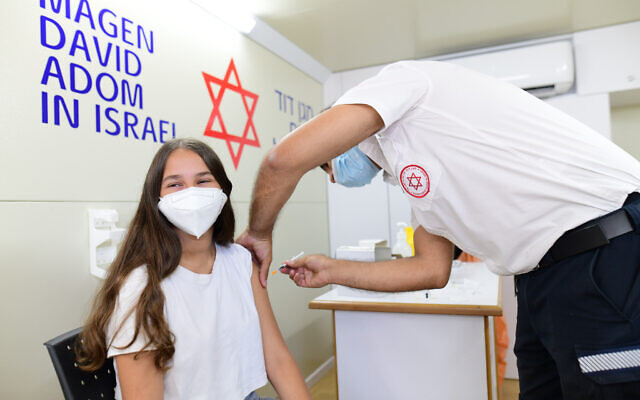Why is Israel Now Struggling Again with the Spread of Covid?

We all remember Israel being the first country in the world to vaccinate most of its citizens against COVID-19 and it looked like things were rapidly getting back to normal. Masks came off, stores and restaurants opened, and Israelis started traveling again. The government predicted that tourists would be welcomed back this summer. Now Israel is seeing one of the world’s highest infection rates with around 7500 news cases every day. What happened?
1. As predicted, the vaccine’s immunity weakens over time.
This was predicted when the vaccines were first introduced. Back then, Prime Minister Netanyahu alerted to the need for a third booster shot, which was thought to be necessary by the end of this summer.
But then the Delta variant arrived at the shores of Israel just as the immunization protections were waning among large portions of Israel’s older population and a large number of younger Israeli’s remained unvaccinated.
“The most influential event was so many people who went abroad in the summer — vacations — and brought the delta variant very, very quickly to Israel,” said Siegal Sadetzki, a former public health director in Israel’s Health Ministry.
2. If you get infected a weakened vaccine still helps.
On Thursday, the Health Ministry reported that serious cases among unvaccinated people over age 60 (178.7 per 100,000) was nine times more than the rate among fully vaccinated people of the same age. The rate of serious cases among unvaccinated people under-60 (3.2 per 100,000) was a little more than double the rate among vaccinated people in the same age group.
In other words, even a weakened vaccine immunity helps a lot.
Still, half of Israel’s hospitalized patients were fully vaccinated at least five months ago, most of whom are over 60 years old and have underlying conditions. The seriously ill patients who are not vaccinated are mostly young, healthy people.
Health officials say that currently 600 seriously ill patients are hospitalized, and they warn they cannot handle more than 1,000 serious infections at the same time. Deaths from the virus rose from 5 in June to 248 so far this month.
Israel is now trying to slow the spread of the Delta variant without resorting to lockdowns as Israel approaches the Jewish holiday’s beginning with Rosh Hashana on the eve of September 6th. Prime Minister Naftali Bennett has warned that another lockdown would take an unprecedented economic toll on the country and the government is now imposing limitations on gatherings and trying to convince people who have so far resisted to get vaccinated.
3. Booster shots seem to offer more protection
Israel is the first country to offer a third shot of the Pfizer vaccine in a nationwide booster campaign. Initial results suggest that booster shots increase protection against the coronavirus, including the Delta variation, a week after a person receives the third dose.
According to Israel’s Maccabi Healthcare Services which conducted a study of 149,144 Israelis who received three Pfizer shots, the booster reduced the chances of infection by 86% and reduced the chances of severe infection by 92% among Israel’s 60-year-olds and above.
After reviewing Israel’s data, the US announced a booster shot campaign beginning in late September and the UK is promising boosters soon.
Israel has lowered the minimum age for boosters to 40. “The triple dose is the solution to curbing the current infection outbreak,” Anat Ekka Zohar of Maccabi said in a statement.
The World Health Organization has called on
countries to stop giving COVID-19 booster shots in order to help poorer
countries get vaccinated.
Some are predicting that just like the flu, we will need to get regular Covid-19 vaccines. “I don’t know of any disease where we are vaccinated every six months, and to be honest, I don’t think the public will come to get vaccinated every six months,” Hadari said. “But you cannot predict anything with this disease.”
More than a million Israelis have already received the Pfizer booster since the beginning of August. Just like the first round of vaccines, the world now watches as Israel becomes the first nation to give a third booster vaccine to a large portion of the population. Most Israelis continue to keep rolling up their sleeves and keeping their fingers crossed.
No comments:
Post a Comment